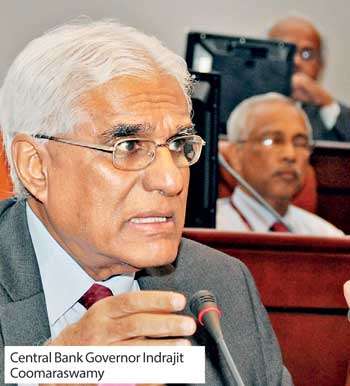Reply To:
Name - Reply Comment
 The Central Bank left its key policy rates unchanged as expected yesterday, saying a low rates environment and stabilising inflation will support an economy in the face of a fragile rupee currency.
The Central Bank left its key policy rates unchanged as expected yesterday, saying a low rates environment and stabilising inflation will support an economy in the face of a fragile rupee currency.
Political uncertainty stoked by the ruling coalition’s loss in local polls in February has cast a shadow on Sri Lanka’s economy, which slowed to a 16-year low of 3.3 percent in 2017, prompting an unexpected rate cut in April. Growth is under more pressure as rising U.S. interest rates have seen foreigners pull out funds from emerging markets. The Central Bank said in a statement its monetary board’s decision is “consistent with stabilising inflation at mid-single digit levels in the medium term, thereby contributing to a favourable growth outlook for the Sri Lankan economy.”
“The sustained recovery in the global economy is likely to support domestic economic growth, while the prevalence of a low inflation environment and an appropriately valued flexible exchange rate are also expected to facilitate higher growth.”
The Central Bank left the Standing Lending Facility Rate (SLFR) at 8.50 percent and Standing Deposit Facility Rate (SDFR) at 7.25 percent. The market had expected both rates to be kept steady.
Government officials have forecast economic growth of around 4.5 percent this year, less than the Central Bank’s projection of around 5 percent.
“At this moment the Central Bank can’t do anything,” said Dimantha Mathew, head of research, First Capital Holdings.
“The economy is too slow, so the rates needed to be cut. But the foreign outflow from the government securities is high, so you can’t cut the rates.”
The Central Bank unexpectedly cut its key lending rate by 25 basis points in April to support the economy, but policymakers must also defend a fragile rupee as the Federal Reserve’s rate increases draw funds from emerging markets toward dollar-denominated assets.
The spot rupee hit an all-time low of 160.17 per dollar on June 20 and is down 3.6 percent so far this year, after falling 2.5 percent last year. Currency dealers expect around a 6 percent fall this year.
“Much of this depreciation was recorded since late April, reflecting the broad based strengthening of the US dollar in the international market,” the Central Bank said, adding that it intervened to address speculative behaviour and unwarranted volatility.
Since April 18, Sri Lanka has seen Rs.28.7 billion (US$181.3 million) of foreign outflows from government securities, Central Bank data showed.
The previous rate increases along with tight fiscal measures to meet conditions imposed by the International Monetary Fund for a US$1.5 billion loan have dragged on the economy.
-(Colombo) REUTERS